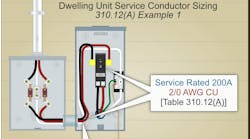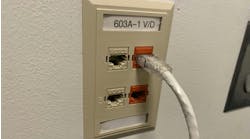For a newcomer to the electrical trade, there are many moving parts on these job sites, so understanding how all the pieces fit together is critical — and how your role (as an electrical apprentice) fits into that overall big picture.
In the last few editions of E-Train, I discussed why it’s so important for electrical apprentices to understand the hierarchy of a typical electrical job site, and highlighted a few key roles, including project manager, superintendent, and journeyman. This week, it’s time to examine the role of the foreman.
Serving in the top electrical supervisory role on a construction job site, the foreman oversees the journeyman, apprentices, temp labor sent from job agencies, and outside vendors (e.g., deliveries from suppliers, coring companies, equipment, system programmers, and various subcontractors) required to complete the entire project.
When you reported to the job site on your first day, it may have looked a little chaotic on the surface, but don’t worry — the foreman has everything under control. A foreman’s No. 1 priority is to manage the day-to-day activity on the job site and communicate to the boss how things are going. The boss provides feedback to the foreman on the pace and progression of the job, the quality of the electrical installation, and labor management.
As far as characteristics and traits you will need to develop in order to one day advance to this role, the foreman has a firm understanding of the National Electrical Code and the National Fire Alarm & Signaling Code. Always making sure everything is completed in a methodical order, the foreman is typically a trusted, seasoned, time-tested veteran of the electrical industry. However, if your company experiences explosive growth or a shortage in manpower, you could find yourself in a leadership position earlier than expected. So watch and learn, taking mental notes of everything the foreman does while working in sync with your journeyman.
The foreman's primary focus in this high-pressure position is keeping the project on schedule and constantly reviewing the current project plan(s). He or she must be well-organized to manage a barrage of change orders and additions that continuously change the workflow while simultaneously keeping the original project finish date — all while maintaining and enforcing safety at all times. The foreman must understand how everything works, including:
- Schematics
- Heating and air systems
- Control, lighting, and power systems
- Electrical and construction equipment
- Plans, blueprints, safety gear, and building codes
- Building materials, carpentry, plumbing, and fire alarm systems
- New, untested technologies being deployed on the project for the first time
Foremen are smart enough to find out what they don’t know, seeking assistance and finding someone proficient in a skill that they’re not. But, most importantly, the foreman must ensure that the project reaches completion professionally and efficiently no matter what. This often requires making personal sacrifices to accomplish this task.
A foreman’s duties can include, but are not limited to:
- Monitoring the project budget and expenses
- Training, managing, and mentoring employees
- Making tough decisions on the boss’ behalf
- Troubleshooting routine issues that may occur on the job site
- Scheduling the work based on employee and contractor availability
- Monitoring the production level and professionalism of all electricians on the job site
Although his or her skills may often seem mythological, they're not. Experience, integrity, and instinct guides this type of leader. The foreman must make changes on the fly, when necessary, while using foresight to plan each daily task according to weather conditions, local ordinances, material, and equipment availability. One of a foreman’s most significant responsibilities is resolving conflicts, disputes, or miscommunications quickly and amicably. Keep all this in mind whenever you contact the foreman; make your point quickly and efficiently.
And remember that everything you do is a reflection on your team and your foreman. So always use power tools, equipment, and ladders properly. The company you work for is judged on its safety practices and number of accidents, so you definitely don't want to be the reason the boss gets an unsatisfactory safety rating for your lack of care.
As with the roles of project manager, superintendent, and journeyman, the foreman is a unique position you can aspire to reach further along in your career. You set the pace at which you go through this electrical journey, and your actions or inaction determine whether you achieve your goals.
One final note: Thanks for making this column such a success. Your feedback has been essential, and I love reading your comments. Drop me a line to let me know about the most pressing issues you feel electrical apprentices entering the electrical industry need to know.
De Loach, a master electrician and electrical trainer/instructor, is the founder of The Academy of Industrial Arts (www.taia-school.com) in Philadelphia. With more than 30 years of experience in the field, he will be writing regular exclusive content for E-Train and can be reached at [email protected].




